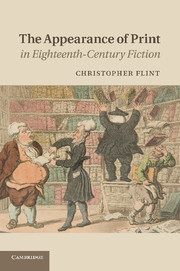Introduction: Prose Fiction and Print Culture in Eighteenth-Century Britain
Published online by Cambridge University Press: 07 September 2011
Summary
I do not think altogether the worse for a book for having survived the author a generation or two. I have more confidence in the dead than the living.
(William Hazlitt, “On Reading Old Books,” 1821)This work opens with the simple proposition that eighteenth-century British prose fiction, what Hazlitt largely means by “old books” (xii, 220), focused considerable attention on the material appearance of the printed book and connected that scrutiny to the appearance of a seemingly new type of popular fiction. Such awareness, I contend, assumed a wide variety of forms. It included experimentation with the physical layout of the page and the deployment of different fonts and typographical marks. It similarly involved representations and descriptions of printed or handwritten matter within a text – such as letters, found manuscripts, legal documents, sermons, lists, books, pamphlets, newspapers, and so on. More generally, this fascination with the physical properties of books extended to the public circulation of texts themselves. In The Appearance of Print I confront the seeming paradox that a genre supposedly invented to make mundane reality transparent, visibly recorded the self-conscious manipulation of its typographical nature. As a collective effort to reproduce everyday experience, what made a great deal of eighteenth-century fiction culturally effective was its capacity to circulate intimacy and affect without appearing to be a self-conscious or self-consciously public artifice. I stress the word “appearing” because, in fact, popular fiction, customarily about private lives, was inevitably a highly public form of discourse. That is, “the novel” was not so much a record of privacy and individualism as a vehicle by which such elusive concepts could be publicly mediated. As Robinson Crusoe’s “Editor” notes, “If ever the story of any private man’s adventures in the world were worth making publick, and were acceptable when published, the editor of this account thinks this will be so” (i). Implicit in Defoe’s authorial self-effacement as “Editor” of The Life and Strange Surprizing Adventures of Robinson Crusoe (1719) is the complementary erasure of “private” experience when made “acceptable” as “published” work.
- Type
- Chapter
- Information
- Publisher: Cambridge University PressPrint publication year: 2011



